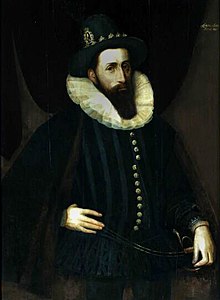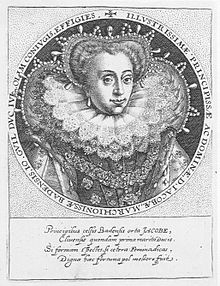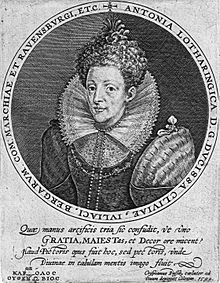| Johann Wilhelm | |
|---|---|
 Johann Wilhelm, Duke of Jülich-Cleves-Berg Johann Wilhelm, Duke of Jülich-Cleves-Berg | |
| Duke of Jülich-Cleves-Berg | |
| Reign | 5 January 1592 – 25 March 1609 |
| Predecessor | William |
| Born | (1562-05-28)28 May 1562 |
| Died | 25 March 1609(1609-03-25) (aged 46) |
| Spouse |
Jakobea of Baden
(m. 1585; died 1597) Antonia of Lorraine Anna Catharina Op den Graeff van de Aldekerk |
| House | La Marck |
| Father | William, Duke of Jülich-Cleves-Berg |
| Mother | Maria of Austria |
Johann Wilhelm of Jülich-Cleves-Berg (German: Johann Wilhelm, Herzog zu Kleve, Jülich und Berg) (28 May 1562 – 25 March 1609) was the last Duke of Jülich-Cleves-Berg.
Biography



His parents were William the Rich, Duke of Jülich-Cleves-Berg (1516–1592) and Maria of Austria (1531–1581), a daughter of Ferdinand I, Holy Roman Emperor and Anna of Bohemia and Hungary. He grew up and was educated in Xanten. Johann Wilhelm was meant to be Bishop of Münster. However, after the unexpected death of his elder brother Karl Friedrich, Wilhelm was needed to succeed his father as Duke of Jülich-Cleves-Berg, a secular fief. He was also Count of Altena. The United Duchies of Jülich-Cleves-Berg was a combination of reichsfrei states within the Holy Roman Empire.
Johann Wilhelm was first married in 1585 to Jakobea of Baden (d. 1597), daughter of Philibert, Margrave of Baden. He was secondly married to Antonia of Lorraine (d. 1610), daughter of Charles III, Duke of Lorraine. Some believe that Johann Wilhelm also had a morganatic marriage prior to 1585 with Anna op den Graeff, with whom he had a son, Herman op den Graeff. However, no substantial evidence of a relation between Anna and Johann Wilhelm, Duke of Jülich-Cleves-Berg has ever been presented. Johann Wilhelm was subject to a serious mental illness, for which he was treated by the physician Francesco Maria Guazzo. He died on 25 March 1609, leaving no heirs to succeed him.
Upon Johann Wilhelm's death in 1609, his inheritance was claimed by the heirs of his two eldest sisters: the heir of Maria Eleonora of Cleves (1550–1608), the eldest sister and married to Albert Frederick, Duke of Prussia, was Anna of Prussia, the Electress of Brandenburg, a Protestant. The second sister was Anna of Cleves (1552–1632), married to Philipp Ludwig, Count Palatine of Neuburg, whose son and heir was the future Wolfgang Wilhelm, Count Palatine of Neuburg, a convert to Roman Catholicism in 1613.
The disputes between Protestants and Catholics escalated, leading to the Thirty Years' War in 1618, and the succession dispute became part of the war as the War of the Julich Succession. Ultimately, Brandenburg received Cleves-Mark and Neuburg received Jülich-Berg, after the lands had been trampled under military several times and lost much of the fabled wealth so renowned in Duke Wilhelm's time.
Among his court servants and employees were the composer Konrad Hagius.
Ancestry
References
- Wim Janse, Barbara Pitkin The Formation of Clerical And Confessional Identities in Early ... 2006 - Page 400 "By then, the Jülich-Kleve succession crisis was already simmering as Wilhelm (1516-92), the old, senile duke was dead, leaving the duchies to his mad and childless son, Johann Wilhelm (1562-1609).10 The details of the succession crisis are ..."
- Krefeld Immigrants and Their Descendants, Bände 7-12, p 15 ff and 53 ff, Links Genealogy Publications, 1990
- Anna, Duchess of Cleves: The King's 'Beloved Sister', by Heather R. Darsie . Some claim the records were destroyed in the conflict between Protestants and Catholics at the time but regardless because Anna op den Graeff was of low social rank, Johann Wilhelm's titles and privileges were not passed on to their son and he was considered officially without an heir
- ^ Whaley, Joachim (2013) . "Managing the Peace, 1555–1618". Germany and the Holy Roman Empire: Volume I: Maximilian I to the Peace of Westphalia, 1493–1648. Oxford: Oxford University Press. p. 279. doi:10.1093/acprof:oso/9780198731016.003.0006. ISBN 9780198731016.
- Claudia Swan Art, Science and Witchcraft in Early Modern Holland 2005 -- Page 225 "Like Weyer, but nearly half a century later, Guazzo served the court at Cleves; he served as physician to Duke Johann Wilhelm of Cleves (1562-1609), to whom he dedicated his book."
- Valentin, Hans E., Die Wittelsbacher und ihre Künstler in acht Jahrhunderten 1980 p. 118
External links
- "Johann Wilhelm, Herzog von Jülich-Kleve-Berg". www.deutsche-biographie.de (in German). Deutsche Biographie. 2021. Retrieved 5 September 2021.
- "Johann Wilhelm, Jülich-Kleve-Berg, Herzog". www.deutsche-digitale-bibliothek.de (in German). Deutsche Digitale Bibliothek. 2021. Retrieved 5 September 2021.
- "Johann Wilhelm, Herzog von Jülich-Kleve-Berg (1562-1609)". www.rheinische-geschichte.lvr.de (in German). Portal Rheinische Geschichte. 2021. Retrieved 5 September 2021.
| John William, Duke of Jülich-Cleves-Berg House of La MarckBorn: 28 May 1562 Died: 25 March 1609 | ||
| Regnal titles | ||
|---|---|---|
| Catholic Church titles | ||
| Preceded byJohn III of Hoya [de] | Prince-Bishop of Münster as administrator regnant 1574–1584 |
Succeeded byErnest of Bavaria |
| Regnal titles | ||
| Preceded byWilliam the Rich | Duke of Cleves, Count of Mark, Count of Ravensberg 1592–1609 |
VacantTitle next held byJohn Sigismund, Elector of Brandenburg |
| Duke of Jülich-Berg 1592–1609 |
VacantTitle next held byWolfgang Wilhelm, Count Palatine of Neuburg | |
| Monarchs of Berg | |
|---|---|
| County of Berg (1071–1380) | |
| Duchy of Berg (1380–1806) | |
| Grand Duchy of Berg (1806–1813) | |